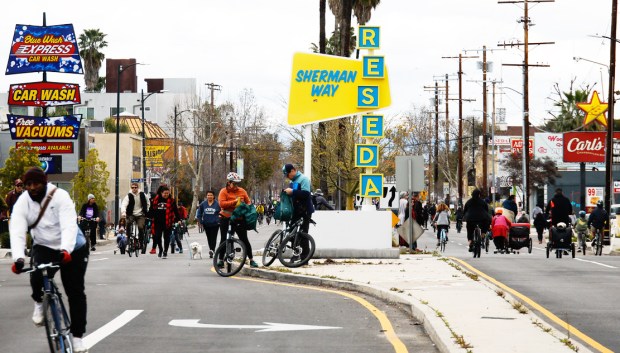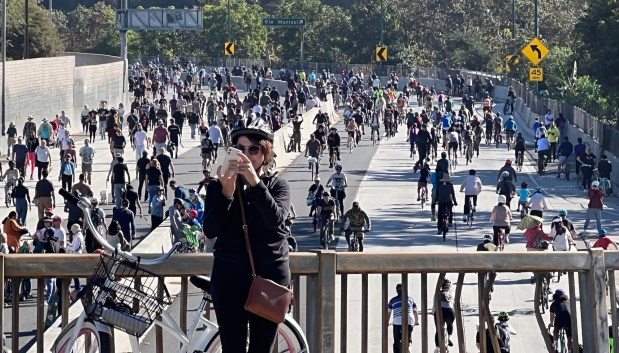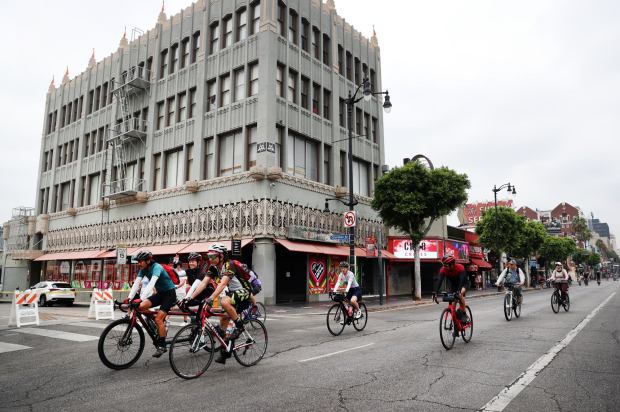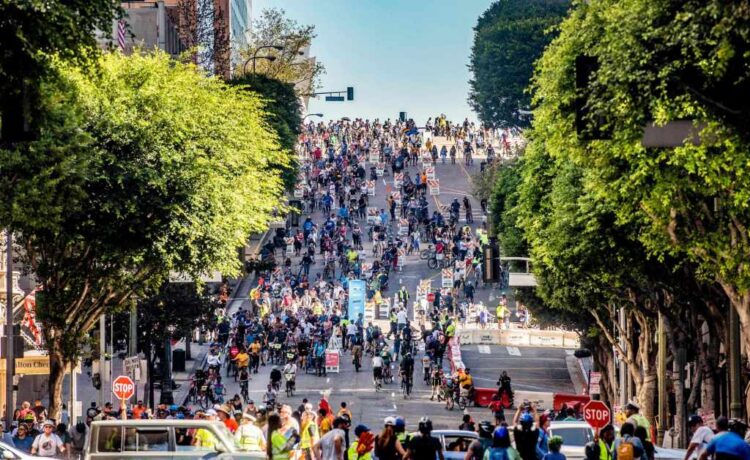Riders roll down Bunker Hill on Grand Avenue on an eight mile “open streets” route from the Walt Disney Concert Hall to the Hollywood Bowl on Sunday, Sept. 30, 2018 in Los Angeles. The event, sponsored by CicLAvia and LA Phil, celebrates the LA Phil’s centennial season. LA Metro on Jan. 25, 2024 approved a slimmed down awards formula, cutting most open streets and “CicLAvia” event funds by 20%, leading some organizers to wonder if they can afford to put on the events in 2024 and 2025 when faced with rising costs. (Photo by Nick Agro, contributing photographer)
The trimming of grants for open streets events in L.A. County that ban automobile traffic to make way for bicyclists, pedestrians and other non-motorized uses left most events with inadequate funding that could prevent events from happening, organizers said last week.
Grants approved by the LA Metro board on Thursday, Jan. 25 reduced funding by up to 20% for events set to take place within the next two years, requiring organizers to scramble to make up the funding gaps or cancel events.
Of the 16 events that received funds,12 were given 80% of the amount requested, making it nearly impossible to put on events when facing inflation of the cost for public safety, traffic control and insurance, organizers said. Metro did not fund 12 other events requested by cities and nonprofit groups.
“This means fewer than one event per month in a county of 10 million. Cities across the world host Ciclovias weekly. Surely a county of 10 million can realize a goal of at least one event per month,” said Wes Reutimann, deputy director and founder of ActiveSGV, a group that has staged six “open streets” or Ciclovia events since 2017, including ArroyoFest 2 that attracted nearly 50,000 people to walk and bike on a closed part of the 110 Freeway on Oct. 29, 2023.

Those not funded included two events planned for the San Fernando Valley, one on Ventura Boulevard for December and another in Northridge scheduled for May 2025. Events in Wilmington, Long Beach, Hawthorne, Lincoln Heights and MacArthur Park also were not funded.
The Metro board of directors approved spending just under $5.5 million for 16 open streets events for 2024-2025 without discussion. Chair and L.A. Mayor Karen Bass denied those who wanted to speak, saying they had their chance to make one-minute comments at the Metro Planning and Programming Committee on Jan. 17.
Since the cost of law enforcement coverage, insurance and street controls such as barricades and signs has risen, Reutimann expected a bump in funding, not cuts. He asked Metro to increase its total awards by $2 million. Metro’s annual budget is $9 billion.
“These events introduce tens of thousands of people to Metro service,” he told the committee. “We cannot do ambitious events like the ArroyoFest under current funding levels.”

Others agreed that Metro was shorting events that introduce residents to pollution-free transportation, such as walking, bicycling or using battery-operated scooters. Also, ActiveSGV events are paired with Metro rail lines. For example, most of the 4,000 10K racers in the recent ArroyoFest rode Metro rail to the South Pasadena A Line Station, where the event began.
“This is the best marketing for services that Metro provides and for getting people out of their cars. We need 10 times more funding than this. And this is such a small amount of money,” said Eli Lipmen, executive director of the nonprofit Move LA, speaking at the committee meeting.
Some ActiveSGV open streets events are funneled through the San Gabriel Valley Council of Governments (SGVCOG), which helps with contracting. The ActiveSGV and SGVCOG’s “626 Golden Streets, Mission Meets Eclectic” planned for April 28 received $400,000, 20% less than the $500,000 requested. That event scored very high in Metro’s ranking for proposed events.
“Our application scored well but our events are being recommended for partial funding,” said SGVCOG spokesperson Ricky Choi at the committee meeting.
The committee agreed with the staff recommendation to cut most of the requests by 20%, especially those from nonprofits and governmental agencies that had experience with putting on similar events in the past. The full board voted in favor of the awards as recommended by staff, without modifications.
Ray Sosa, Metro’s chief planning officer, explained that the new approach was intended to spread the monies around to include other areas that hadn’t had an open street event. “We took this approach to try to reach as many new users as possible,” he said. He hoped the experienced organizers would find other sources of funding to make up the gap.
L.A. County First District Supervisor and LA Metro board member Hilda Solis was pleased that a new open streets event planned for East Los Angeles for fall 2025 was funded at $400,000, the requested amount. “I’m glad to see East Los Angeles is included,” she said at the committee meeting. “It’s a large, unincorporated area and where we are trying to get them to use public transportation.”
Third District Supervisor and LA Metro board member Lindsey Horvath noted that L.A. events, known as “CicLAvias” received most of the awards. Of the 16 funded, nine were “CicLAvia” events. Also, the city of West Hollywood, where Horvath served on the City Council, received $400,000, a 20% cut from the requested amount, for its “Meet the Hollywoods “CicLAvia” planned for Aug. 24.
“I love ‘Ciclovia.’ I try to go to a lot of them and I certainly see the value of them,” Horvath said at the committee meeting.

Reutimann said he’s not sure if open streets events that were planned for 2024 or 2025 can still take place because of the drop in funding from Metro. He said he cannot skimp on public safety, as threats from active shooters and cars ramming through barricades become higher level concerns these days.
Instead, he’s considering cutting out games and arts, such as crafting tables, kids’ rides and live music, he said.
Despite calls from many who wanted to see a third ArroyoFest on the closed 110 Freeway in Pasadena, South Pasadena and Los Angeles, Reutimann said he can’t risk putting in an application next year if grants are leveled at $400,000 or less.
“They know that public safety costs have gone up. How can they expect us to do these events for less money?” he said in an interview after the vote.
In the last 10 years, LA Metro has spent $26 million on open streets events, the staff reported.













